Items filtered by date: October 2024
Causes and Types of Flat Feet
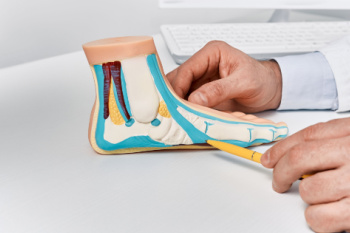
Flat feet, or pes planus, is a common condition where the arches of the feet are either low or completely absent, causing the soles to make full contact with the ground. The causes of flat feet can vary widely, including genetic predisposition, muscle imbalances, and injuries that affect the ligaments and tendons. In some cases, flat feet can develop during childhood as the arches form, while others may experience it as adults due to wear and tear or medical conditions. There are two primary types of flat feet, which are known as flexible and rigid. Flexible flat feet are characterized by arches that appear when sitting but flatten when standing, usually causing minimal discomfort. Rigid flat feet maintain a flat appearance regardless of position and can lead to pain and difficulty with movement. Flat feet can cause pain and discomfort. If you have this condition, iti is suggested that you consult a podiatrist who can offer you relief tips, and guide you on what type of shoes to wear.
Flatfoot is a condition many people suffer from. If you have flat feet, contact one of our podiatrists from Princeton Foot and Ankle Associates. Our doctors will treat your foot and ankle needs.
What Are Flat Feet?
Flatfoot is a condition in which the arch of the foot is depressed and the sole of the foot is almost completely in contact with the ground. About 20-30% of the population generally has flat feet because their arches never formed during growth.
Conditions & Problems:
Having flat feet makes it difficult to run or walk because of the stress placed on the ankles.
Alignment – The general alignment of your legs can be disrupted, because the ankles move inward which can cause major discomfort.
Knees – If you have complications with your knees, flat feet can be a contributor to arthritis in that area.
Symptoms
- Pain around the heel or arch area
- Trouble standing on the tip toe
- Swelling around the inside of the ankle
- Flat look to one or both feet
- Having your shoes feel uneven when worn
Treatment
If you are experiencing pain and stress on the foot you may weaken the posterior tibial tendon, which runs around the inside of the ankle.
If you have any questions please feel free to contact our offices located in Princeton, and West Windsor, NJ . We offer the newest diagnostic and treatment technologies for all your foot and ankle needs.
Managing Achilles Tendon Ruptures
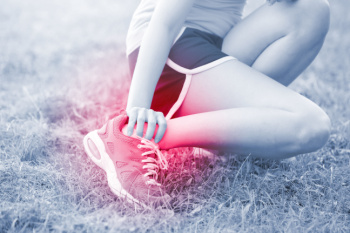
The Achilles tendon is a strong, fibrous band that connects the calf muscles to the heel bone. It enables you to walk, run, and jump. When overstressed, the Achilles tendon can tear or rupture. This causes a sharp pain at the back of the leg or ankle, often accompanied by a snapping sound. Patients may experience trouble standing on their toes, walking, or climbing the stairs. Swelling and bruising surrounding the ankle or foot are other symptoms. Achilles tendon injuries commonly occur during sports involving sudden directional changes, such as basketball or tennis. A diagnosis is usually made through a physical exam, but imaging, like an MRI scan, may be required. Treatment varies based on the severity and may involve a splint, boot, or surgery. A podiatrist can evaluate the extent of the Achilles tendon injury and recommend a treatment plan to promote proper healing and prevent re-injury. If you have ruptured your Achilles tendon, it is suggested that you schedule an immediate appointment with a podiatrist.
Achilles tendon injuries need immediate attention to avoid future complications. If you have any concerns, contact one of our podiatrists of Princeton Foot and Ankle Associates. Our doctors can provide the care you need to keep you pain-free and on your feet.
What Is the Achilles Tendon?
The Achilles tendon is a tendon that connects the lower leg muscles and calf to the heel of the foot. It is the strongest tendon in the human body and is essential for making movement possible. Because this tendon is such an integral part of the body, any injuries to it can create immense difficulties and should immediately be presented to a doctor.
What Are the Symptoms of an Achilles Tendon Injury?
There are various types of injuries that can affect the Achilles tendon. The two most common injuries are Achilles tendinitis and ruptures of the tendon.
Achilles Tendinitis Symptoms
- Inflammation
- Dull to severe pain
- Increased blood flow to the tendon
- Thickening of the tendon
Rupture Symptoms
- Extreme pain and swelling in the foot
- Total immobility
Treatment and Prevention
Achilles tendon injuries are diagnosed by a thorough physical evaluation, which can include an MRI. Treatment involves rest, physical therapy, and in some cases, surgery. However, various preventative measures can be taken to avoid these injuries, such as:
- Thorough stretching of the tendon before and after exercise
- Strengthening exercises like calf raises, squats, leg curls, leg extensions, leg raises, lunges, and leg presses
If you have any questions please feel free to contact our offices located in Princeton, and West Windsor, NJ . We offer the newest diagnostic tools and technology to treat your foot and ankle needs.
The Impact of High Heels on Foot Biomechanics
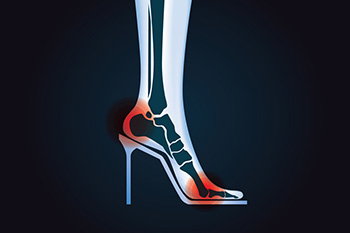
Wearing high heels can significantly alter foot biomechanics, leading to various issues over time. The elevated position of the heel shifts body weight forward, increasing pressure on the forefoot and contributing to the development of bunions. This misalignment forces the big toe to deviate, causing painful deformities. Additionally, high heels can result in ankle inversion injuries, as the instability and lack of support increase the risk of rolling the ankle during movement. Prolonged wear can also lead to osteoarthritis, particularly in the joints of the feet, due to the excessive strain placed on them. Understanding these potential consequences is essential for people who frequently wear high heels. If you have developed a foot condition from wearing high heels, it is suggested that you consult a podiatrist who can offer effective treatment methods and guide you on choosing different shoe options.
High heels have a history of causing foot and ankle problems. If you have any concerns about your feet or ankles, contact one of our podiatrists from Princeton Foot and Ankle Associates. Our doctors can provide the care you need to keep you pain-free and on your feet.
Effects of High Heels on the Feet
High heels are popular shoes among women because of their many styles and societal appeal. Despite this, high heels can still cause many health problems if worn too frequently.
Which Parts of My Body Will Be Affected by High Heels?
- Ankle Joints
- Achilles Tendon – May shorten and stiffen with prolonged wear
- Balls of the Feet
- Knees – Heels cause the knees to bend constantly, creating stress on them
- Back – They decrease the spine’s ability to absorb shock, which may lead to back pain. The vertebrae of the lower back may compress.
What Kinds of Foot Problems Can Develop from Wearing High Heels?
- Corns
- Calluses
- Hammertoe
- Bunions
- Morton’s Neuroma
- Plantar Fasciitis
How Can I Still Wear High Heels and Maintain Foot Health?
If you want to wear high heeled shoes, make sure that you are not wearing them every day, as this will help prevent long term physical problems. Try wearing thicker heels as opposed to stilettos to distribute weight more evenly across the feet. Always make sure you are wearing the proper shoes for the right occasion, such as sneakers for exercising. If you walk to work, try carrying your heels with you and changing into them once you arrive at work. Adding inserts to your heels can help cushion your feet and absorb shock. Full foot inserts or metatarsal pads are available.
If you have any questions please feel free to contact our offices located in Princeton, and West Windsor, NJ . We offer the newest diagnostic and treatment technologies for all your foot and ankle needs.
Plantar Warts Can Be Treated!
Key Facts About Athlete's Foot
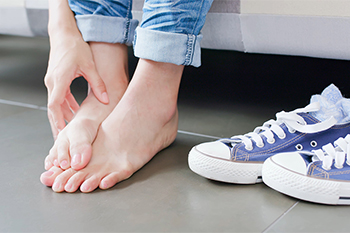
Athlete's foot, or tinea pedis, is a common fungal skin infection that loves damp, warm environments. Fungi, which are tiny microorganisms, thrive in these conditions and can cause mild but annoying rashes when they infect the skin. Though typically not dangerous, athlete’s foot can be quite irritating. Symptoms include itching, burning, and redness between the toes or on the soles of the feet. You might also notice peeling or cracking skin, which can sometimes lead to a secondary bacterial infection if left untreated. While athletes are often associated with this condition due to their sweaty feet, anyone can get athlete’s foot. To prevent it, keep your feet dry and clean, and avoid walking barefoot in public showers or pools. If you suspect you have athlete's foot it is suggested you schedule an appointment with a podiatrist for a diagnosis and treatment plan.
Athlete’s Foot
Athlete’s foot is often an uncomfortable condition to experience. Thankfully, podiatrists specialize in treating athlete’s foot and offer the best treatment options. If you have any questions about athlete’s foot, consult with one of our podiatrists from Princeton Foot and Ankle Associates. Our doctors will assess your condition and provide you with quality treatment.
What Is Athlete’s Foot?
Tinea pedis, more commonly known as athlete’s foot, is a non-serious and common fungal infection of the foot. Athlete’s foot is contagious and can be contracted by touching someone who has it or infected surfaces. The most common places contaminated by it are public showers, locker rooms, and swimming pools. Once contracted, it grows on feet that are left inside moist, dark, and warm shoes and socks.
Prevention
The most effective ways to prevent athlete’s foot include:
- Thoroughly washing and drying feet
- Avoid going barefoot in locker rooms and public showers
- Using shower shoes in public showers
- Wearing socks that allow the feet to breathe
- Changing socks and shoes frequently if you sweat a lot
Symptoms
Athlete’s foot initially occurs as a rash between the toes. However, if left undiagnosed, it can spread to the sides and bottom of the feet, toenails, and if touched by hand, the hands themselves. Symptoms include:
- Redness
- Burning
- Itching
- Scaly and peeling skin
Diagnosis and Treatment
Diagnosis is quick and easy. Skin samples will be taken and either viewed under a microscope or sent to a lab for testing. Sometimes, a podiatrist can diagnose it based on simply looking at it. Once confirmed, treatment options include oral and topical antifungal medications.
If you have any questions, please feel free to contact our offices located in Princeton, and West Windsor, NJ . We offer the newest diagnostic and treatment technologies for all your foot care needs.
Definition and Causes of a Bunion
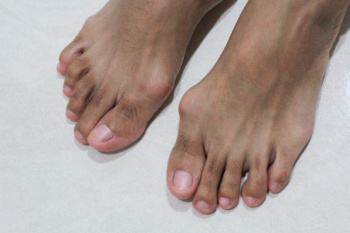
Bunions are bony protrusions that form at the base of the big toe, often causing the tip of the toe to angle toward the other toes. Symptoms typically include pain, swelling, and redness around the joint, which may worsen with prolonged standing or walking. Bunions often develop due to genetic factors, improper footwear, or abnormal foot mechanics. Wearing tight or high-heeled shoes can worsen the condition by putting pressure on the toe joint. Diagnosing bunions usually involves a physical examination and may include X-rays to assess the extent of bone displacement and joint damage. For severe cases, surgical options may be considered to correct the deformity and alleviate pain. If you have symptoms of a bunion, it is suggested that you schedule an appointment with a podiatrist who can suggest treatment methods that are right for you.
If you are suffering from bunions, contact one of our podiatrists of Princeton Foot and Ankle Associates. Our doctors can provide the care you need to keep you pain-free and on your feet.
What Is a Bunion?
A bunion is formed of swollen tissue or an enlargement of boney growth, usually located at the base joint of the toe that connects to the foot. The swelling occurs due to the bones in the big toe shifting inward, which impacts the other toes of the foot. This causes the area around the base of the big toe to become inflamed and painful.
Why Do Bunions Form?
Genetics – Susceptibility to bunions are often hereditary
Stress on the feet – Poorly fitted and uncomfortable footwear that places stress on feet, such as heels, can worsen existing bunions
How Are Bunions Diagnosed?
Doctors often perform two tests – blood tests and x-rays – when trying to diagnose bunions, especially in the early stages of development. Blood tests help determine if the foot pain is being caused by something else, such as arthritis, while x-rays provide a clear picture of your bone structure to your doctor.
How Are Bunions Treated?
- Refrain from wearing heels or similar shoes that cause discomfort
- Select wider shoes that can provide more comfort and reduce pain
- Anti-inflammatory and pain management drugs
- Orthotics or foot inserts
- Surgery
If you have any questions, please feel free to contact our offices located in Princeton, and West Windsor, NJ . We offer the newest diagnostic and treatment technologies for all your foot care needs.

